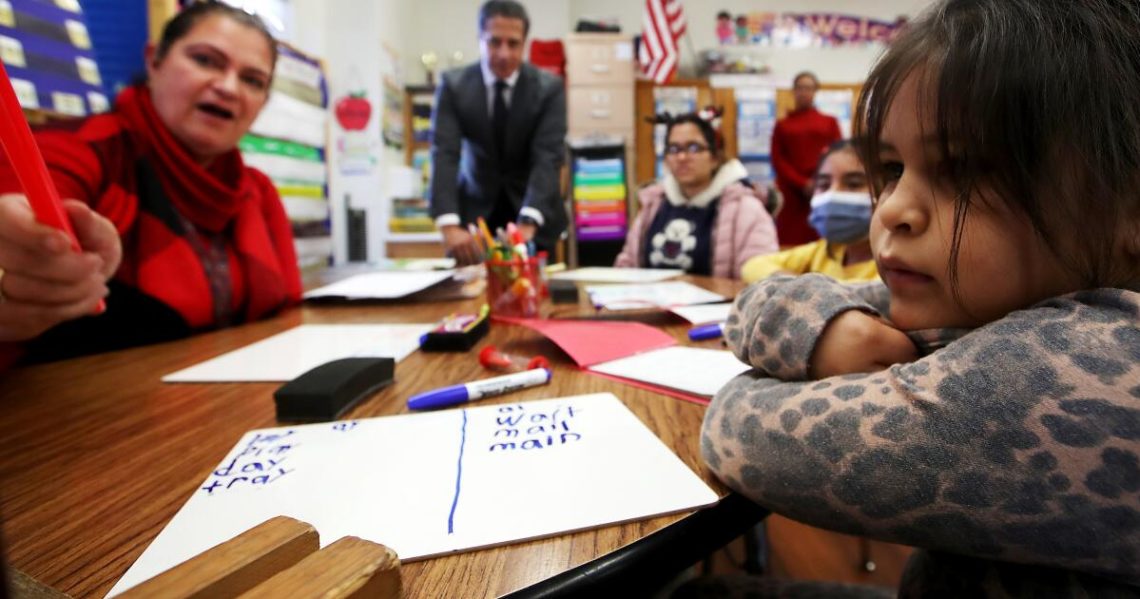One bill aims to raise lagging reading skills among California children by mandating how schools teach this critical subject. Another seeks to overhaul cafeteria meals by eliminating highly processed foods. A third aims to protect students from being derailed by discrimination.
These bills and others passed by the Legislature in the session’s final busy days will directly affect the classroom experience of some 5.8 million California public schools students. Broadly speaking, these bills target students’ minds, health and emotional well-being — and the results were not without controversy.
The measures now land on the desk of Gov. Gavin Newsom, who has until Oct. 12 to approve or reject them.
Assembly Bill 715: Anti-discrimination
Among the most hotly contested education-related measures, Assembly Bill 715 was spawned from dissatisfaction — largely among a coalition of Jewish groups — to the way ethnic studies is being taught in some California classrooms. Critics say that in some schools, ethnic studies classes have improperly focused on the Israel-Palestinian conflict and that they reflect bias against Jews. The allegations of bias are denied by those instructors who include the conflict in their syllabus.
The final version of the bill — paired with companion Senate Bill 48 — would expand the focus beyond antisemitism, a revision that responds to those who questioned why the original bill language addressed only discrimination against Jews.
“California has taken a historic stand against antisemitism in our schools,” said David Bocarsly, executive director of the Jewish Public Affairs Committee of California. “For far too long, Jewish students have endured slurs, bullying, and open hostility in their classrooms with nowhere to turn. AB 715 is a promise to those students — and to all children in California — that they are not invisible, that their safety and dignity matter.”
The legislation that finally emerged would create a state Office for Civil Rights that reports to the governor’s cabinet. It would take on a monitoring and assistance mission — fielding complaints and questions; preparing learning materials and reports on identifying and combating discrimination; and helping teachers, schools and school districts comply with state anti-discrimination laws.
Different forms of discrimination would be addressed by a specialized coordinator — one each for antisemitism, religious discrimination, race and ethnicity discrimination, gender discrimination and LGBTQ+ discrimination.
Issues related to ethnic studies would include ensuring anti-discriminatory course and teacher training materials. To investigate formal complaints, the state would rely on an existing complaint procedure, which examines alleged violations involving discrimination, harassment, intimidation and bullying.
Critics of AB 715 — which include the California Teachers Assn. — acknowledge that bill was revised to address their concerns but still oppose it. They say it could chill discussion of controversial issues in ethnic students and elsewhere and also falsely equate legitimate criticism of Israel with antisemitism.
AB 1454: Science of Reading
A sweeping bill would overhaul how reading is taught in California classrooms — mandating phonics-based lessons and culminating decades of debate on how best to teach children this foundational skill. The bill is unusual in a state that generally emphasizes local control over instruction.
AB 1454 would require school districts to adopt instructional materials grounded in what supporters call the “science of reading,” which is based on research about how young children learn to read.
The now-favored approach leans heavily on decoding and sounding out words based on the letter sounds, while laying out five pillars for more effective instruction: phonemic awareness (the sounds that letters make), phonics, reading fluency, vocabulary and comprehension.
The hope is that this teaching style will boost persistently disappointing test scores.
A 2022 study of 300 school districts in California found that fewer than 2% of districts were using curricula that proponents viewed as sufficiently strong in science-of-reading practices.
These advocates have long been critical of alternative “whole language” approaches that rely heavily on the concept that children are more engaged when they learn to read with less emphasis on decoding words. Teachers focus instead on surrounding children with books to foster a love of reading, directing children to figure out unknown words based on context, pictures and other clues.
“Transforming California’s education system requires a coordinated approach rooted in proven solutions,” said Marshall Tuck, CEO of EdVoice, an education advocacy nonprofit that has championed the change.
Many California teachers, however, remain committed to different methods and chafe at a state-mandated approach, especially one that runs counter to their classroom experience and previous training. Advocates for students learning English have voiced especially strong opposition to the science-of-reading philosophy.
AB 1264: Ultra-processed foods
Chicken nuggets, corn dogs, packaged frozen pizza, chips, canned fruits and sugary cereals are the types of ultra-processed foods in school meals targeted in Assembly Bill 1264, which would require healthier cafeteria options in the years ahead.
Heavily processed foods often include reconstituted meat along with chemical additives such as preservatives, emulsifiers, coloring and other ingredients absent from scratch cooking — not to mention added sugars, fats and salt — that together can harm students “physical and mental health and interfere with their ability to learn,” according to bill author Assemblyman Jesse Gabriel (D-Encino).
The bill was opposed by manufacturers who considered it too constraining and too subject to non-scientific whims.
The final version eased some concerns by setting up a review process rather than simply listing foods and chemicals to ban. There also is a gradual phase-in over several years.
The expectation is that processed foods that remain on the menu will be healthier and also that there will be an acceleration of efforts to prepare foods within school kitchens, relying as much as possible on local and fresh ingredients.
AB 564: Cannabis tax and child care
The Legislature also voted to claw back an increase to the cannabis excise tax, which took effect in July and raised the state tax rate paid by consumers to 19%. The goal is to bolster the struggling legal-cannabis industry. A chunk of child-care funding is among the casualties of the lower tax revenue.
Assembly Bill 564 would mean an estimated $180-million annual reduction for law enforcement, child care, services for at-risk youth and environmental cleanup. Of the total, about $81 million would have funded subsidized child-care slots for about 8,000 children from low-income families. Overall, the state budget to assist with child care is $7 billion, a figure that advocates view as short of what’s needed, especially with further potential cuts looming.
Other notable measures
Assembly Bill 461 would end the treatment of truancy as a crime under state law. Existing law can subject the parent or guardian of a student who is chronically absent or late to school with a fine of up to $2,000 and imprisonment for up to one year.
Prosecutions are rare and the potential penalties are typically viewed as deterrents. But the pendulum in California has shifted away from tough-on-truancy measures to alternatives such as counseling and family assistance.
The Legislature also has passed bills in support of immigrant families, that will frequently have a carryover effect on how schools operate, such as a bill that bars immigration officers from campus unless they have a valid judicial warrant.
Times staff writer Daniel Miller contributed to this report. Gold reports for The Times’ early childhood education initiative, focusing on the learning and development of California children from birth to age 5. For more information about the initiative and its philanthropic funders, go to latimes.com/earlyed.
The post These bills could change your child’s school experience. They are not without controversy appeared first on Los Angeles Times.




